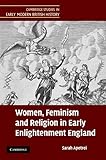Women, feminism and religion in early Enlightenment England / Sarah Apetrei.
Material type: TextSeries: Cambridge studies in early modern British history: Publisher: Cambridge ; New York : Cambridge University Press, 2010Description: x, 325 pages : illustrations ; 24 cmContent type: text Media type: unmediated Carrier type: volumeISBN: 9780521513968; 0521513960; 9781107696709; 1107696704Subject(s): Women -- England -- History -- 17th century | Feminism -- England -- History -- 17th century | Women's rights -- England -- History -- 17th century | Women and religion -- England -- History -- 17th century | Astell, Mary, 1668-1731 | Feminism | Women | Women and religion | Women's rights | England | Feminismus | Religion | England | Frau | Soziale Situation | Religion | Recht | England | Författare -- England -- 1600-talet | Feminism -- religion -- rättslig ställning | Protestantism | Feminism -- England -- historia -- 1600-talet | Kvinnor -- England -- historia -- 1600-talet | Kvinnor och religion -- historia -- 1600-talet | 1600 - 1699Genre/Form: History.DDC classification: 200.82 LOC classification: HQ1149 | .A64 2010Online resources: Table of contents | Contributor biographical information | Cover image | Publisher description
TextSeries: Cambridge studies in early modern British history: Publisher: Cambridge ; New York : Cambridge University Press, 2010Description: x, 325 pages : illustrations ; 24 cmContent type: text Media type: unmediated Carrier type: volumeISBN: 9780521513968; 0521513960; 9781107696709; 1107696704Subject(s): Women -- England -- History -- 17th century | Feminism -- England -- History -- 17th century | Women's rights -- England -- History -- 17th century | Women and religion -- England -- History -- 17th century | Astell, Mary, 1668-1731 | Feminism | Women | Women and religion | Women's rights | England | Feminismus | Religion | England | Frau | Soziale Situation | Religion | Recht | England | Författare -- England -- 1600-talet | Feminism -- religion -- rättslig ställning | Protestantism | Feminism -- England -- historia -- 1600-talet | Kvinnor -- England -- historia -- 1600-talet | Kvinnor och religion -- historia -- 1600-talet | 1600 - 1699Genre/Form: History.DDC classification: 200.82 LOC classification: HQ1149 | .A64 2010Online resources: Table of contents | Contributor biographical information | Cover image | Publisher description | Item type | Current library | Call number | Copy number | Status | Notes | Date due | Barcode |
|---|---|---|---|---|---|---|---|
 Books
Books
|
Female Library | HQ1149 .A64 2010 (Browse shelf (Opens below)) | 1 | Available | STACKS | 51952000207412 |
"Illuminating a formative period in the debate over sexual difference, this book contributes to our understanding of the origins of feminist thought. In late seventeenth-century England, female writers from diverse religious and political traditions confronted the question of women's subordination. Their feminist protests disturbed even those who championed women's education and defended female virtue. Some of these women, including Lady Mary Chudleigh and the Tory feminist Mary Astell, have attracted interest for their literary achievements and philosophical originality. This book approaches them from a new perspective, arguing that the primary impulse for their feminism was religious reformism: manifest in personal devotion, serious theological reflection and a vision for moral renewal and social justice. This reforming feminism, Sarah Apetrei argues, links Astell to the assertive women of dissenting and spiritualist traditions. Far from being a constraining influence on feminism, religion was a stimulus to new thinking about the status of women"--Provided by publisher.
Includes bibliographical references and index.
Female advocates: defences of women in seventeenth-century England -- "Out of choice and not necessitie": the celibacy of Mary Astell -- Reason, gender and the passions in Mary Astell -- Mary Astell's feminism and the religion of Protestants -- Quaker women and Protestant renewal -- Millenarians and Philadelphians -- The universal principle of grace -- The divine life: celestial flesh and inner light -- Conclusion.
2

There are no comments on this title.